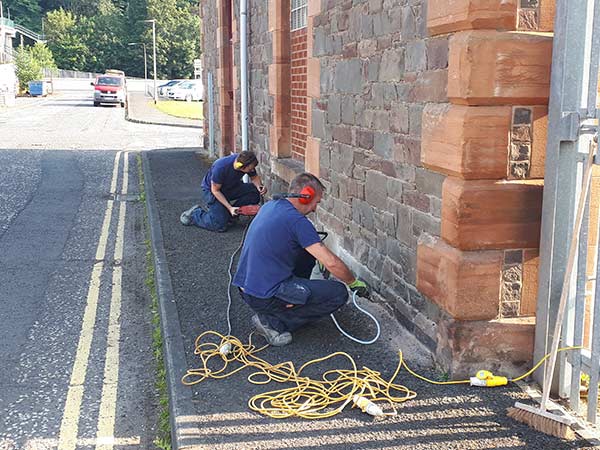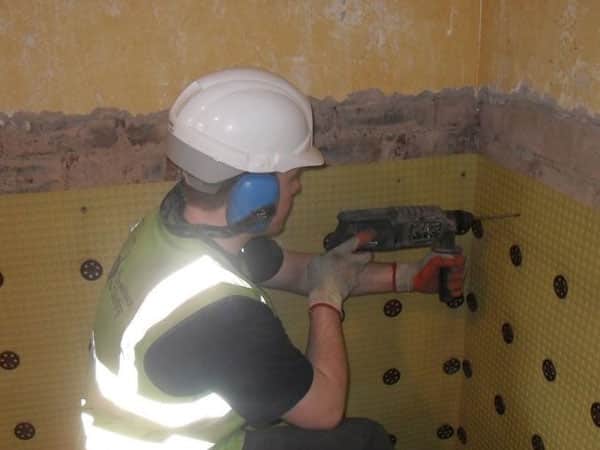Damp Proof Injection

Damp proof injection is a fast, cost-efficient and highly effective form of rising damp treatment. It is commonly used as a remedial damp proof course on buildings where the existing DPC has failed due to age or deterioration. DPC injection is designed to seep into the brickwork in order to prevent moisture from the ground rising up through the bricks by capillary action and causing rising damp.
Tired of reading? Listen to this article!
Also known as wall injection damp proofing, damp proof injection involves drilling a series of holes in the property and injecting the silicone-based damp proof cream. Once this cream has been injected, it diffuses rapidly before curing to form a replacement water-repellent DPC for the affected area. The great thing about damp proof injection is that it can be used in walls that have suffered from severe water saturation.Damp course injection is a long-lasting solution to damp problems. Once installed, damp proof injections should remain effective for the at least the period of the provided guarantee, which in our case is 30 years.
What is a Damp Proof Course?
A Damp Proof Course, or DPC for short, is a barrier that stops damp from the ground rising up into a building. There are two main types of DPC: membrane damp proofing and chemical damp proofing.
Membrane damp proofing is essentially an impervious barrier which is laid along the bottom brickwork at least 150mm above the ground level during the construction of a house. Chemical damp proofing is usually a remedial DPC, meaning it is introduced by damp proofing specialists when the original DPC fails.
Damp proof injection refers to the installation of chemical damp proofing along the base of the walls of a building that is suffering from rising damp. While it does not form a physical barrier like membrane damp proofing, it lines the pores of the masonry wall with a silicone resin water repellent.
How Do Damp Proof Injection Creams Work?
Damp proof creams are scientifically formulated to penetrate deep inside the building material. They have a consistency that allows the active ingredient, silane, to be absorbed into the substrate both vertically and horizontally without running out. The silane then lines the capillaries before curing to create a water repellent barrier.
The type of chemical damp proof course that should be used is dependent on the wall construction and aqueous based fluid DPC’s may be injected by using high-pressure and low-pressure techniques instead of using DPC creams. Chemical injection DPC is usually used for brick or stone buildings, and our experienced surveyors know exactly how to recommend the most suitable remedial action.
Damp Proof Treatment Using Injections
After our initial survey, our technicians will get to work preparing the affected area both internally and externally before the damp injection begins. This may involve removing fixtures and fittings such as skirting boards and radiators to provide access.
If your property is suffering from rising damp, then any salt contaminated plaster will need removed before injecting a damp proof course. Plaster is usually removed to a height of no less than one metre to remove the salt affected plaster prior to injecting the chemical DPC.

Small holes (around 12mm) will then be drilled horizontally into the wall mortar joint to a depth of around 20 – 30mm from the full thickness of the wall, and the damp proof course will be injected into the boreholes. Left in the wall, the injected chemicals will penetrate the masonry surrounding the borehole. The cream then gets to work creating a water-repelling barrier.
After the damp proof injection, our team will re-plaster internally. Our specific re-plastering materials will ensure that any residual salts in the masonry do not affect the new plaster. This chemical damp proofing solution will provide you with a minimum of 30 years of damp free walls in your property.
Damp Survey
When damp appears in your property, you need an experienced damp specialist to accurately diagnose the cause of the problem and provide the most appropriate repair specification. Failure to properly diagnose a damp related problem can result in unnecessary repairs and further costly damage.
Our Surveyors are qualified to CSRT standard (Certificate Surveyor in Remedial Treatment) and experienced in all types of damp issues that could affect your property. With over 85 years’ experience in property preservation, we have the experience and knowledge to tackle any property damp problem you might have, with industry-leading guarantees that are backed up by protection insurance schemes.Have you noticed any signs of damp in your property? Let one of our experienced surveyors inspect your issue.
